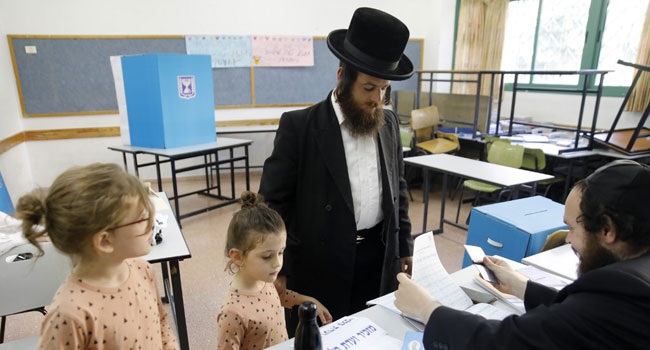Israel Election: Exit Polls Show Possibility Of Another Deadlock
Israeli Prime Minister Benjamin Netanyahu and his main challenger Benny Gantz were locked in a tight race in the country’s general election after polls closed Tuesday, exit surveys showed, raising the possibility of another deadlock.
Three separate exit polls carried by Israeli television stations showed Netanyahu’s right-wing Likud and Gantz’s centrist Blue and White alliance with between 31 and 34 parliament seats each out of 120.
Ex-defence minister Avigdor Lieberman’s nationalist Yisrael Beitenu party, which could play a kingmaker role, could win between eight and 10 seats, according to the polls.
If the exit polls are reasonably accurate — and they have in the past been off base — either Netanyahu or Gantz will face tough negotiations to form a government.
After the exit polls were released, Lieberman called for a unity government with his party, Likud and Blue and White as he addressed supporters, saying the country was facing an “emergency”.
“There is only one option for us,” he said, adding the unity government should exclude the country’s ultra-Orthodox religious parties, which he accuses of having undue influence on politics.
The exit survey results prompted initial cheers at Blue and White’s post-election party in Tel Aviv, where they were shown on large screens before doubts began to set in.
“We have an advantage, but I see that we are dependent on Lieberman,” said supporter Dina Margoli, 40.
At Likud’s post-election rally, music played and chants of “Bibi king of Israel” broke out, using Netanyahu’s nickname.
“Hopefully when the real results come some of these results will change and we’ll be able to form a coalition like we wanted to before,” Likud parliament member Sharren Haskel told AFP.
“And if not we’ll have to try and find another way to do it.”
Immunity?
The stakes could not be much higher for the 69-year-old Netanyahu, Israel’s longest-serving prime minister but who is facing possible corruption charges in the weeks ahead.
He spent the day warning he was on the verge of losing if his supporters did not turn out to vote, including in appearances at Jerusalem’s main market and its central bus station, wielding a megaphone to exhort the crowds.
He repeatedly warned, as he has in previous elections, that left-wing and Arab voters were showing up in large numbers to vote him out, appearing on Facebook live to do so.
Gantz voted in his hometown of Rosh Haayin near Tel Aviv and called on the country to reject corruption and “extremism”.
Later he visited a shopping mall in the northern city of Haifa and addressed the public through a megaphone on the beach in Tel Aviv.
Fears of election fatigue did not materialize, with the turnout at 69.4 percent, higher than in April polls.
Netanyahu, prime minister for a total of more than 13 years, suffered one of the biggest defeats of his political career following an election in April.
His Likud along with its right-wing and religious allies won a majority, leading President Reuven Rivlin to task him with forming a government.
But following weeks of discussions, Netanyahu failed, opting for an unprecedented second election rather than risk Rivlin choosing someone else.
Many believe that if he wins, Netanyahu could seek to have parliament grant him immunity from prosecution ahead of a possible corruption indictment in the weeks ahead.
He spent the final days of the campaign seeking to appeal to right-wing nationalists — key to his re-election bid — and to boost turnout among his base.
Those efforts included a controversial pledge to annex the Jordan Valley, a third of the occupied West Bank.
He issued unfounded warnings that the vote could be stolen by fraud in Arab communities, leading critics to accuse him of racism.
But Netanyahu has also highlighted the country’s growing economy and his relationships with world leaders such as US President Donald Trump.
‘Normal again’
Gantz has presented himself as an honourable alternative.
He repeatedly spoke of Netanyahu’s willingness to form a coalition with far-right parties that could help him secure immunity.
Gantz says his alliance, which includes three former armed forces chiefs of staff, wants a unity government that the vast majority of Israelis would support.
A campaign by Lieberman’s nationalist Yisrael Beitenu to “make Israel normal again” appeared to have resonated with voters.
The staunch secularist has long campaigned against what he sees as the undue clout of ultra-Orthodox Jewish parties, which he accuses of seeking to impose Jewish religious law on Israel’s secular population.
Lieberman has demanded legislation to make military service mandatory for the ultra-Orthodox as for other Jewish Israelis — a demand he refused to drop after April polls, eventually blocking Netanyahu’s efforts to form a coalition.
Separately, if exit polls showing Israel’s newly reunified Arab parties with between 11 and 13 seats are accurate, they could potentially block Netanyahu from continuing as prime minister by recommending Gantz.
AFP



